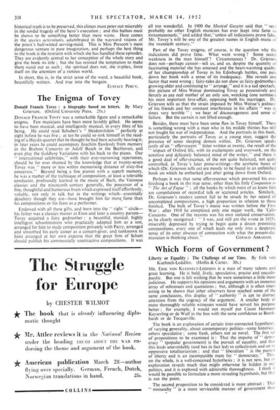The Enigma of Tovey
Donald Francis Tovey : a biography based on letters. By Mary Grierson. (Oxford University Press. 21s.)
DONALD FRANCIS TOVEY was a remarkable figure and a remarkable enigma. Few musicians have been more lavishly gifted. He seems to have been musical, and intelligently musical, in every fibre of his being. He could read Schubert's " Heidenroslein " perfectly at sight before he was five ; at ten he could so sink himself in the read- ing of a Haydn quartet that he thought he had been actually hearing it; in later years he could accompany Joachim flawlessly from memory in the Brahms Concerto or Adolf Busch in the Beethoven, and even play the Goldberg Variations with his back to the piano. Our " international celebrities," with their ever-narrowing repertoires, should be for ever shamed by the knowledge that at twenty-seven Tovey was " more or less within memorising distance of sixty-five concertos." Beyond being a fine pianist with a superb memory, he was a master of the technique of composition, at least a tolerable conductor, profoundly learned in the music of Bach, the Viennese classics and the nineteenth century generally, the possessor of a fine, thoughtful and humorous brain which expressed itself effortlessly, volubly, not only in talk but in the writings which—essentially desultory though they are—have brought him far more.. fame than his compositions or his feats as a performer.
Endowed with all these gifts, and born into the " right " circle— his father was a classics master at Eton and later a country parson- Tovey acquired a fairy godmother : a beautiful, musical, highly intelligent schoolmistress who practically adopted him as a son, arranged for him to study composition privately with Parry, arranged and smoothed his early career as a concert-giver, and (unknown to him) arranged at her own expense that the great firm of Schott should publish his commercially unattractive compositions. It was
all too wonderful. In 1900 the Musical Gazette said that " very probably no other English musician has ever leapt into fame so instantaneously," and added that," unless all indications prove false. Mr. Tovey's will be one of the greatest names in English music of the twentieth century."
Part of the Tovey enigma, of course, is the question why the indications did prove false. What went wrong ? Some secret weakness in the man himself ? Circumstances ? Dr. Grierson does not—perhaps cannot—tell us, and so, despite the quantity of fascinating material she has amassed and the heart-warming quality of her championship of Tovey in his Edinburgh battles, one puts down her book with a sense of its inadequacy. She reveals one factor that went wrong ; fairy-tales do not show us fairy-godmothers growing older and continuing to " arrange," and it is a sad spectacle, this picture of Miss Weisse dominating Tovey as possessively and fiercely as any real mother of an only son, wrecking (one surmises) his most important love-affair, opposing both his marriages. Dr. Grierson tells us that the strain imposed by Miss Weisse's jealousy of his friends and her constant interference in his affairs " was at times very terrible " ; we hear of discouragement and sense of failure. But the curtain is not lifted enough.
Besides, there must have been some flaw in Tovey himself. There is something wrong with a man who in his middle thirties has still not fought his war of independence. And the portraits in this book, particularly the portraits of Tovey as a young man, suggest the presence of some sleeping demon within. Dr. Grierson speaks justly of an " effervescent " letter written at twenty, the result of the " impact of Oxford life, with its excitements and overwork, on the sensitive and delicately balanced mind of the writer," and there is a good deal of effervescence, of the not quite balanced, not quite controlled, in Tovey's later prose-writings—the aesthetic bases of which (Dr. Grierson tells us) are mostly to be found in an unfinished book on which he embarked just after going down from Oxford.
Perhaps it was that same effervescence which prevented his ever finishing a book in the true sense, other than his little Companion so " The Art of Fugue " ; all the books by which most of us know him are compilations of recorded talk or scattered articles. Similarly, Dr. Grierson's readers cannot fail to be struck by her record of uncompleted compositions, a high proportion in relation to those finished. The bulk of Tovey's music was written before the First War ; after 1918 he completed only one major work, the 'Cello Concerto. One of the reasons was his own isolated conservatism, as he clearly recognised : " I was, and still am (he wrote in 19251. miserably depressed by trying to begin quite a dozen promising compositions, every one of which leads me only into a desperate sense of its utter absence of connection with what the present-day










































 Previous page
Previous page